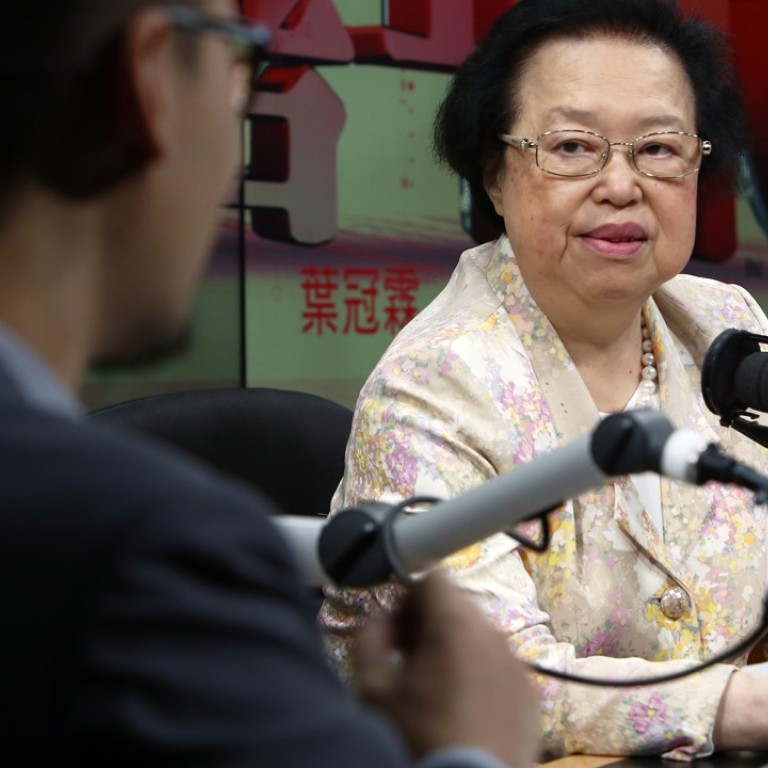
‘Not enough evidence to prosecute Hong Kong separatist Andy Chan’: Beijing loyalist Maria Tam adopts different stance from top official Zhang Xiaoming
She suggests banning Chan’s party under another ordinance while insisting ‘road map’ to national security legislation in city has been developing
A vice-chairwoman of the Basic Law Committee said on Monday there was not enough evidence to prosecute separatist party leader Andy Chan Ho-tin for sedition as spelled out in the Crimes Ordinance, rejecting the recommendation of a top mainland Chinese official.
In her remarks, the first by a pro-Beijing heavyweight to differ from that of Zhang Xiaoming, director of the State Council’s Hong Kong and Macau Affairs Office, Maria Tam Wai-chu said using the Societies Ordinance still made the most sense to put a grip on the activities of the Hong Kong National Party (HKNP) founder.
Speaking on a morning radio programme, Tam said: “I think we can [use] the Societies Ordinance first, and set aside other ordinances for the time being.”
Andy Chan cannot be charged under current Hong Kong law, city lawyers say
She also said she believed the road map for controversial national security legislation, as set out in the Basic Law’s Article 23, “has been developing” in the city.
Last week, following a fiery speech by Chan at the Foreign Correspondents’ Club, Zhang called for the separatist leader to be charged under Article 9 of the Crimes Ordinance, enacted in Hong Kong under colonial rule to criminalise acts or publications that may incite hatred, discontent or disaffection with the queen.
But Tam said there was not enough evidence to support such a move.
“There is a need to prove that … violence was incited,” Tam said. “From the reactions of others, we have not reached such a stage yet.
There is a need to prove that … violence was incited
“We cannot prove [Chan’s] act incited people to commit a crime,” she added.
While Zhang’s remarks were also the strongest hint so far dropped by a mainland official on the city’s obligation to enact the national security legislation, Tam said she believed Hong Kong was already heading in that direction as it established more links with Beijing through integration strategies, transport infrastructure projects and cultural exchanges.

She conceded that the city could become a weakness to China’s national security if it did not use its existing laws. “Promoting independence causes a lot of problems,” she said.
“Since we are not enforcing our existing laws, there is a big loophole in our legal system when it comes to maintaining social order, national security and territorial integrity.”
Hong Kong needs national security law but only when time is right, says Carrie Lam
Under Article 23 of the Basic Law, Hong Kong’s mini-constitution, the city is obliged to enact national security legislation “to prohibit any act of treason, secession, sedition [or] subversion against the [central government]”. An attempt in 2003 to pass the law ended in spectacular failure when half a million residents took to the streets in protest at what they saw as a threat to civil liberties, forcing officials to shelve plans.
Tam said while there seemed to be no timetable for a second bid, “there is already a road map, even though no one else might see it that way”.
Andy Chan rebuked for calling on US President Donald Trump
We should fight for democracy ... but we should not rely on foreign forces to do it
“These suggestions would be very damaging for Hong Kong’s interests … We should fight for democracy and a more open electoral system, but we should not rely on foreign forces to do it.”
“We are gradually integrating with the mainland through our infrastructure such as bridges and roads … More students have been taking part in [mainland] study tours. These are all part of the road map towards better understanding and less suspicion between the mainland [and Hong Kong],” she said.
“It would help us to understand the need for Article 23.”
Last month, Hong Kong Secretary for Security John Lee Ka-chiu said police had proposed a ban on the HKNP under the Societies Ordinance, but there was no mention of sedition.
The party has until September 4 to respond and argue its case.

